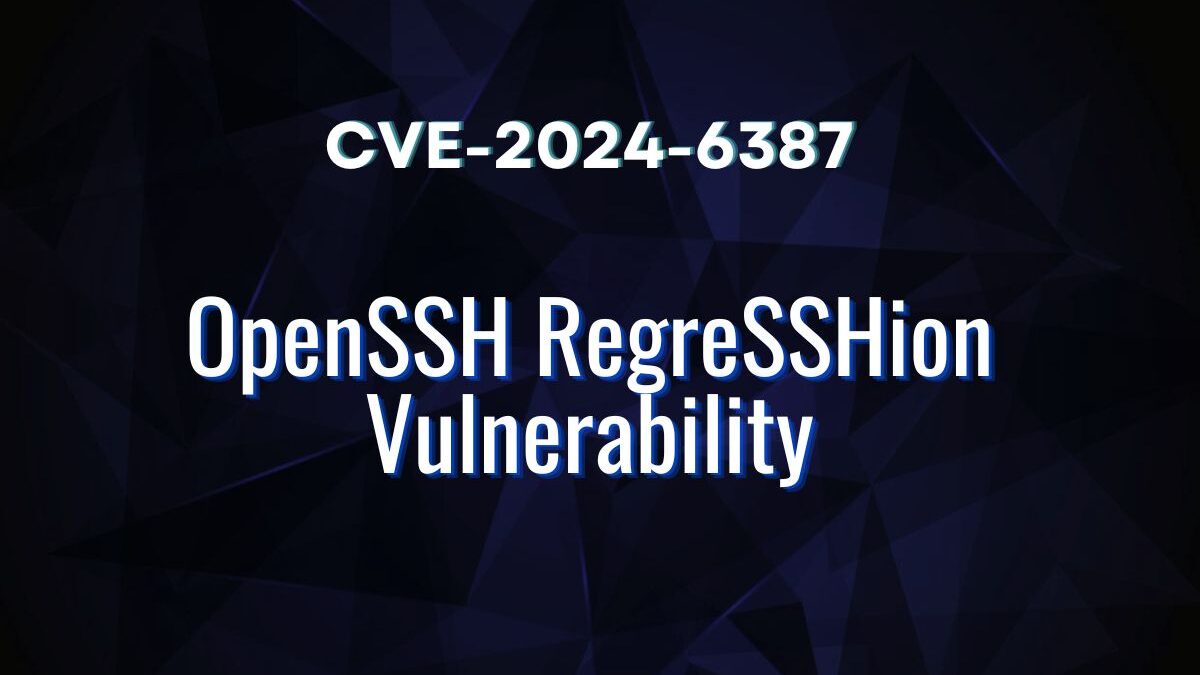Understanding the OpenSSH Regression Vulnerability: CVE-2024-6387
In the realm of cybersecurity, vigilance is not a luxury but a necessity. The recent discovery of the OpenSSH vulnerability, designated as CVE-2024-6387 and colloquially known as “RegreSSHion,” underscores this point emphatically. This blog post delves into the intricacies of this vulnerability, its potential impact, and the steps you can take to safeguard your systems.
CVE-2024-6387 is a critical remote code execution (RCE) vulnerability identified in OpenSSH, a widely used open-source implementation of the SSH protocol. This vulnerability affects OpenSSH servers running on glibc-based Linux systems, stemming from a signal handling race condition in the SIGALRM handler.
At the core of this vulnerability is a race condition triggered by the SIGALRM signal. When a client fails to authenticate within the configured LoginGraceTime, sshd’s SIGALRM handler asynchronously calls non-async-signal-safe functions like syslog(). This unsafe handling can lead to memory corruption and, ultimately, remote code execution.
Versions Affected:
- OpenSSH versions from 8.5p1 up to, but not including, 9.8p1.
- Versions earlier than 4.4p1 if not patched for CVE-2006-5051 or CVE-2008-4109.
The Impact of Regression:
The severity of CVE-2024-6387 cannot be overstated. If exploited, this vulnerability allows an unauthenticated attacker to execute arbitrary code with root privileges, potentially leading to a complete system takeover. This means attackers could install malware, manipulate data, or create backdoors for persistent access, posing a significant risk to affected systems.
The Exploitation Complexity:
Exploiting this vulnerability is not trivial. It requires precise timing and substantial effort due to the asynchronous nature of the SIGALRM handler and the presence of modern security mechanisms like Address Space Layout Randomization (ASLR) and No-eXecute (NX) bits. However, the potential for remote code execution makes this a critical issue that demands immediate attention.
The term “RegreSSHion” aptly describes the nature of this vulnerability. It represents a regression of the previously patched CVE-2006-5051, reintroduced in the OpenSSH 8.5p1 release in October 2020. This incident highlights the importance of thorough regression testing to prevent the reintroduction of known vulnerabilities.
Mitigating the Risk:
Given the critical nature of CVE-2024-6387, immediate action is required to mitigate the risk. Here are the recommended steps:
-
Update OpenSSH: The most effective mitigation is to update OpenSSH to version 9.8p1 or later. This version includes the necessary patches to address the vulnerability.
-
Temporary Mitigation: If an immediate update is not feasible, temporarily reducing the LoginGraceTime can provide some level of protection. However, this is not a long-term solution and should be used with caution.

-
Network Segmentation: Segregate sensitive network segments to limit unauthorized access attempts.
-
Monitoring and Alerts: Implement monitoring solutions to detect suspicious activities and potential exploitation attempts.
-
Firewall Configuration: Configure firewalls to restrict SSH access to trusted IP addresses only.
Conclusion:
The discovery of CVE-2024-6387 serves as a stark reminder of the ever-present need for vigilance in cybersecurity. By understanding the nature of the RegreSSHion vulnerability and taking proactive measures to update and secure your systems, you can protect your infrastructure from potential exploitation. Stay informed, stay updated, and ensure your security measures are robust and up-to-date.

